*第二天/Day 2
今天的第一站是蒙古历史最悠久的寺庙。寺庙非常大,也保留的不错。除了许许多多的佛像外,还可以看到几百年前留下来的壁画。寺庙大部分建筑都供游客参观,和尚们则在角落一个较新的建筑内生活和念经。
This morning, we stopped by the Erdene Zuu Monastery, the first Buddhist monastery in Mongolia. It was a big monastery, with a few halls. Inside the halls, you can see lots of Buddhist statues and also paintings on the walls done a few hundred years ago. Most of the halls are solely meant for tourists visits. The monks lived and prayed in a small hall at the corner of the temple grounds.





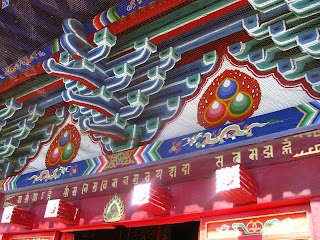
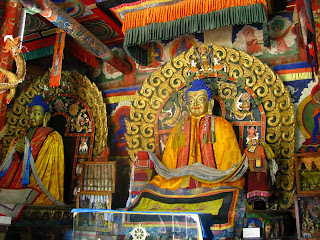



 参观完寺庙后,我们又上路了。和昨天一样,几乎开了一天的车,不过风景还算幽美,期间还看到了漂亮的彩虹, 所以大家没有什么抱怨。到达落脚的地方后,我们乘时间还早,就到当地的市场去逛一逛。原来蒙古人的市场没有所谓的店铺,大家都是把集装箱当店铺,等收档的时候把东西收回集装箱就可以了。我们学当地人那样讨价还价,买了一些菜,就回去煮晚餐。今天隔壁住的是另一组韩国人,两组韩国人自然聊了起来,晚餐后还在那里喝酒,吃泡菜和鱿鱼,还唱起歌来,浑然像是在韩国郊游一样。
参观完寺庙后,我们又上路了。和昨天一样,几乎开了一天的车,不过风景还算幽美,期间还看到了漂亮的彩虹, 所以大家没有什么抱怨。到达落脚的地方后,我们乘时间还早,就到当地的市场去逛一逛。原来蒙古人的市场没有所谓的店铺,大家都是把集装箱当店铺,等收档的时候把东西收回集装箱就可以了。我们学当地人那样讨价还价,买了一些菜,就回去煮晚餐。今天隔壁住的是另一组韩国人,两组韩国人自然聊了起来,晚餐后还在那里喝酒,吃泡菜和鱿鱼,还唱起歌来,浑然像是在韩国郊游一样。
After we were done with the temple, it was back to the road. Just like day one, it was another long drive. But the scenery was beautiful and we even saw a rainbow, so nobody complained about the long drive. Upon reaching our ger camp for the night, we offloaded our stuff and headed straight for the local market for a look. This is the first time we visited a local market. It was interesting to see that there are no proper “shops” in the market. Instead, everybody operates out of containers, displaying their wares on the doors of the containers. At the end of the day, all they have to do is shut everything up in the containers. How convenient! We bargained like a local and managed to get some fresh produce for dinner. Another group of Koreans happened to be staying in the ger next to us. So, after dinner, the two groups of Koreans gathered and drank vodka (they didn’t have soju with them), had some kimchi and dried cuttlefish, sang and chatted just as if they were on a night out in Korea.






 *第三天/Day 3
*第三天/Day 3
今天参观的景点较多,从一个景点到另一个景点的时间较短,所以感觉没有首两天累。先到被当地人视为非常神圣的大石头去看一看。听说如果将硬币投上石头,而硬币落在石头上,没有掉下来的话,你的愿望会实现,所以我们在石头上看到很多硬币。当然有人就尝试将硬币投上去,不过硬币不只投不上去,还差点砸到了旁边人的头。
Compared to the first two days, today was a more relaxing day. There were more stops for sightseeing, meaning that driving time between each sight was short, making it less tiring for us. First stop was this big holy rock. It is said that if you throw a coin at the rock and if the coin manages to remain on the rock, your wishes can come true. So of course, you see lots of coins around the big rock. Somebody in the group tried doing the same thing, only to have the coin falling right on the head of the person next to him.

 之后开了几个小时的车,才终于到一个小镇吃午餐。午餐是tschuivan,即将面粉搓成条状来炸,样子像面条,但味道不一样。蒙古料理就是这样,不是饭加羊肉,就是面条加羊肉,什么都是羊肉、羊肉、羊肉。羊肉的腥味很重,几个韩国人都不喜欢,拿出了他们自备的紫菜来“加料”。嘿,这么一弄,食物果然更好吃。
之后开了几个小时的车,才终于到一个小镇吃午餐。午餐是tschuivan,即将面粉搓成条状来炸,样子像面条,但味道不一样。蒙古料理就是这样,不是饭加羊肉,就是面条加羊肉,什么都是羊肉、羊肉、羊肉。羊肉的腥味很重,几个韩国人都不喜欢,拿出了他们自备的紫菜来“加料”。嘿,这么一弄,食物果然更好吃。
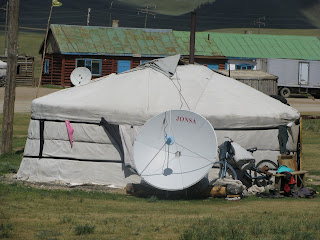 午餐后到附近的一个峡谷看看。没有美国那著名的大峡谷壮观,没有波涛的河水,可是还是廷不错的一个峡谷。
午餐后到附近的一个峡谷看看。没有美国那著名的大峡谷壮观,没有波涛的河水,可是还是廷不错的一个峡谷。
After lunch, we made a stop at Chuluut Canyon. This canyon is of course not as spectacular as that of Grand Canyon in USA. There is no stunning drop, neither is there a great river rushing through. Just a gentle one weaving through. Nonetheless, it is still a gorgeous place.

 下一站是被当地人视为非常神圣的一棵大树。藏族人在朝拜的时候会献上白色布条,蒙古人也一样会献上布条,只不过他们用的是蓝色布条。有些迷信的人则在树的周围留下钱,应该是要祈祷会给自己带来财运或好运吧。有人告诉我们,绕着大树顺时钟走三圈会给自己带来好运,我们当然就照做了。走完后还发现树内住了几只可爱的小松鼠。
下一站是被当地人视为非常神圣的一棵大树。藏族人在朝拜的时候会献上白色布条,蒙古人也一样会献上布条,只不过他们用的是蓝色布条。有些迷信的人则在树的周围留下钱,应该是要祈祷会给自己带来财运或好运吧。有人告诉我们,绕着大树顺时钟走三圈会给自己带来好运,我们当然就照做了。走完后还发现树内住了几只可爱的小松鼠。
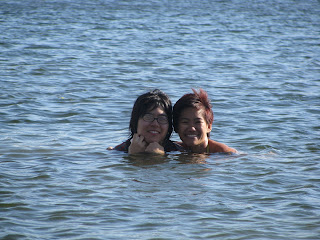




 因为是在湖边,天气非常冷。主人家劈柴给我们起火取暖,可是我们这些傻佬却硬要坐在外头等待日落。待看完日落后,我们个个都已经冷得半死了。
因为是在湖边,天气非常冷。主人家劈柴给我们起火取暖,可是我们这些傻佬却硬要坐在外头等待日落。待看完日落后,我们个个都已经冷得半死了。
今天的第一站是蒙古历史最悠久的寺庙。寺庙非常大,也保留的不错。除了许许多多的佛像外,还可以看到几百年前留下来的壁画。寺庙大部分建筑都供游客参观,和尚们则在角落一个较新的建筑内生活和念经。
This morning, we stopped by the Erdene Zuu Monastery, the first Buddhist monastery in Mongolia. It was a big monastery, with a few halls. Inside the halls, you can see lots of Buddhist statues and also paintings on the walls done a few hundred years ago. Most of the halls are solely meant for tourists visits. The monks lived and prayed in a small hall at the corner of the temple grounds.











 参观完寺庙后,我们又上路了。和昨天一样,几乎开了一天的车,不过风景还算幽美,期间还看到了漂亮的彩虹, 所以大家没有什么抱怨。到达落脚的地方后,我们乘时间还早,就到当地的市场去逛一逛。原来蒙古人的市场没有所谓的店铺,大家都是把集装箱当店铺,等收档的时候把东西收回集装箱就可以了。我们学当地人那样讨价还价,买了一些菜,就回去煮晚餐。今天隔壁住的是另一组韩国人,两组韩国人自然聊了起来,晚餐后还在那里喝酒,吃泡菜和鱿鱼,还唱起歌来,浑然像是在韩国郊游一样。
参观完寺庙后,我们又上路了。和昨天一样,几乎开了一天的车,不过风景还算幽美,期间还看到了漂亮的彩虹, 所以大家没有什么抱怨。到达落脚的地方后,我们乘时间还早,就到当地的市场去逛一逛。原来蒙古人的市场没有所谓的店铺,大家都是把集装箱当店铺,等收档的时候把东西收回集装箱就可以了。我们学当地人那样讨价还价,买了一些菜,就回去煮晚餐。今天隔壁住的是另一组韩国人,两组韩国人自然聊了起来,晚餐后还在那里喝酒,吃泡菜和鱿鱼,还唱起歌来,浑然像是在韩国郊游一样。After we were done with the temple, it was back to the road. Just like day one, it was another long drive. But the scenery was beautiful and we even saw a rainbow, so nobody complained about the long drive. Upon reaching our ger camp for the night, we offloaded our stuff and headed straight for the local market for a look. This is the first time we visited a local market. It was interesting to see that there are no proper “shops” in the market. Instead, everybody operates out of containers, displaying their wares on the doors of the containers. At the end of the day, all they have to do is shut everything up in the containers. How convenient! We bargained like a local and managed to get some fresh produce for dinner. Another group of Koreans happened to be staying in the ger next to us. So, after dinner, the two groups of Koreans gathered and drank vodka (they didn’t have soju with them), had some kimchi and dried cuttlefish, sang and chatted just as if they were on a night out in Korea.







 *第三天/Day 3
*第三天/Day 3今天参观的景点较多,从一个景点到另一个景点的时间较短,所以感觉没有首两天累。先到被当地人视为非常神圣的大石头去看一看。听说如果将硬币投上石头,而硬币落在石头上,没有掉下来的话,你的愿望会实现,所以我们在石头上看到很多硬币。当然有人就尝试将硬币投上去,不过硬币不只投不上去,还差点砸到了旁边人的头。
Compared to the first two days, today was a more relaxing day. There were more stops for sightseeing, meaning that driving time between each sight was short, making it less tiring for us. First stop was this big holy rock. It is said that if you throw a coin at the rock and if the coin manages to remain on the rock, your wishes can come true. So of course, you see lots of coins around the big rock. Somebody in the group tried doing the same thing, only to have the coin falling right on the head of the person next to him.


 之后开了几个小时的车,才终于到一个小镇吃午餐。午餐是tschuivan,即将面粉搓成条状来炸,样子像面条,但味道不一样。蒙古料理就是这样,不是饭加羊肉,就是面条加羊肉,什么都是羊肉、羊肉、羊肉。羊肉的腥味很重,几个韩国人都不喜欢,拿出了他们自备的紫菜来“加料”。嘿,这么一弄,食物果然更好吃。
之后开了几个小时的车,才终于到一个小镇吃午餐。午餐是tschuivan,即将面粉搓成条状来炸,样子像面条,但味道不一样。蒙古料理就是这样,不是饭加羊肉,就是面条加羊肉,什么都是羊肉、羊肉、羊肉。羊肉的腥味很重,几个韩国人都不喜欢,拿出了他们自备的紫菜来“加料”。嘿,这么一弄,食物果然更好吃。After a few hours drive, we finally arrived in a small town for our lunch break. Lunch was tschuivan, a local cuisine. It is actually made of fried dough and mutton. It looked like noodles with meat, but it does not taste the same. Actually, Mongolian food is all about mutton (they call it sheep). Sheep with noodles, sheep with rice, sheep with dough, sheep with potatoes, sheep, sheep, sheep... ...The smell of mutton was too overwhelming, so out came the korean kimchi paste and seaweed, and lunch suddenly tasted wonderful.





 在吃午餐的小镇内留意到了,几乎家家户户都有卫星电视,觉得很纳闷。不是说蒙古人都比较穷吗?怎么把钱花在这个上面呢?后来有人指出,其实蒙古人住家都很简陋,除了家具外就什么也没有,尤其是那些游牧民。如果没有卫星电视,他们就真的没有什么娱乐,也不能了解外面的世界是什么样了。更何况,卫星盘在蒙古很便宜,一个只要200多美金。所以蒙古大多在把钱存够后,第一个买的就是一个卫星盘。
在吃午餐的小镇内留意到了,几乎家家户户都有卫星电视,觉得很纳闷。不是说蒙古人都比较穷吗?怎么把钱花在这个上面呢?后来有人指出,其实蒙古人住家都很简陋,除了家具外就什么也没有,尤其是那些游牧民。如果没有卫星电视,他们就真的没有什么娱乐,也不能了解外面的世界是什么样了。更何况,卫星盘在蒙古很便宜,一个只要200多美金。所以蒙古大多在把钱存够后,第一个买的就是一个卫星盘。





 在吃午餐的小镇内留意到了,几乎家家户户都有卫星电视,觉得很纳闷。不是说蒙古人都比较穷吗?怎么把钱花在这个上面呢?后来有人指出,其实蒙古人住家都很简陋,除了家具外就什么也没有,尤其是那些游牧民。如果没有卫星电视,他们就真的没有什么娱乐,也不能了解外面的世界是什么样了。更何况,卫星盘在蒙古很便宜,一个只要200多美金。所以蒙古大多在把钱存够后,第一个买的就是一个卫星盘。
在吃午餐的小镇内留意到了,几乎家家户户都有卫星电视,觉得很纳闷。不是说蒙古人都比较穷吗?怎么把钱花在这个上面呢?后来有人指出,其实蒙古人住家都很简陋,除了家具外就什么也没有,尤其是那些游牧民。如果没有卫星电视,他们就真的没有什么娱乐,也不能了解外面的世界是什么样了。更何况,卫星盘在蒙古很便宜,一个只要200多美金。所以蒙古大多在把钱存够后,第一个买的就是一个卫星盘。I have heard stories of how poor Mongolians are. And looking at the harsh conditions they have to contend with, it is easy to understand why. Hence you can understand my curiousity as to why every family seems to own a satellite dish in the town that we stopped by for lunch. Only later did someone point out to me, Mongolians are poor. As such, other than furniture, you cannot find anything else in their houses. More so for those living in gers. If they do not even have their satellite tv, they really have no other form of entertainment and will not be able to know what is going on with the world outside. Furthermore, satellite dishes are cheap in Mongolia, each costing only about 200 USD. Thus, whenever Mongolians have saved enough money, the first thing that they will get is bound to be a satellite dish.

 午餐后到附近的一个峡谷看看。没有美国那著名的大峡谷壮观,没有波涛的河水,可是还是廷不错的一个峡谷。
午餐后到附近的一个峡谷看看。没有美国那著名的大峡谷壮观,没有波涛的河水,可是还是廷不错的一个峡谷。After lunch, we made a stop at Chuluut Canyon. This canyon is of course not as spectacular as that of Grand Canyon in USA. There is no stunning drop, neither is there a great river rushing through. Just a gentle one weaving through. Nonetheless, it is still a gorgeous place.


 下一站是被当地人视为非常神圣的一棵大树。藏族人在朝拜的时候会献上白色布条,蒙古人也一样会献上布条,只不过他们用的是蓝色布条。有些迷信的人则在树的周围留下钱,应该是要祈祷会给自己带来财运或好运吧。有人告诉我们,绕着大树顺时钟走三圈会给自己带来好运,我们当然就照做了。走完后还发现树内住了几只可爱的小松鼠。
下一站是被当地人视为非常神圣的一棵大树。藏族人在朝拜的时候会献上白色布条,蒙古人也一样会献上布条,只不过他们用的是蓝色布条。有些迷信的人则在树的周围留下钱,应该是要祈祷会给自己带来财运或好运吧。有人告诉我们,绕着大树顺时钟走三圈会给自己带来好运,我们当然就照做了。走完后还发现树内住了几只可爱的小松鼠。Next stop was this big holy tree. Tibetans use white scarves as offerings, Mongolians use scarves too, only thing is, the scarves they use is blue. As expected, you see offerings of money at the tree too. Probably everyone hopes to get richer or have their prayers answered by throwing their money on the holy tree. Somebody told us that we should walk three times around the tree in a clockwise direction for good luck, and we of course follow suit. Whether I will be blessed, I really don't know. But I did notice little squirrels living in the holy tree. Maybe the squirrels are "holy" too? 


 今天落脚的地方就在一个大湖边。一看到湖水,我们都非常兴奋,因为终于可以洗澡了,所以一下车就立刻换了衣服往水里跑。哪儿知道,湖水是冰冷的,冷得我们无法好好洗澡,随便清洗一下就跑回住处取暖。
今天落脚的地方就在一个大湖边。一看到湖水,我们都非常兴奋,因为终于可以洗澡了,所以一下车就立刻换了衣服往水里跑。哪儿知道,湖水是冰冷的,冷得我们无法好好洗澡,随便清洗一下就跑回住处取暖。
Today's resting place is in Khorgo National Park, right next to the White Lake. After going without a shower for days, you can imagine our excitement at seeing the clear waters. So, the first thing we did after offloading our luggages was to change and head for the lake. Alas, the water was freezing cold. It took 15 minutes of deliberation before I decide to take the plunge and dive into the cold water, only to be shivering throughout the five minutes I was having my so-called shower. We practically ran back to the ger in order to get warm again.



 今天落脚的地方就在一个大湖边。一看到湖水,我们都非常兴奋,因为终于可以洗澡了,所以一下车就立刻换了衣服往水里跑。哪儿知道,湖水是冰冷的,冷得我们无法好好洗澡,随便清洗一下就跑回住处取暖。
今天落脚的地方就在一个大湖边。一看到湖水,我们都非常兴奋,因为终于可以洗澡了,所以一下车就立刻换了衣服往水里跑。哪儿知道,湖水是冰冷的,冷得我们无法好好洗澡,随便清洗一下就跑回住处取暖。Today's resting place is in Khorgo National Park, right next to the White Lake. After going without a shower for days, you can imagine our excitement at seeing the clear waters. So, the first thing we did after offloading our luggages was to change and head for the lake. Alas, the water was freezing cold. It took 15 minutes of deliberation before I decide to take the plunge and dive into the cold water, only to be shivering throughout the five minutes I was having my so-called shower. We practically ran back to the ger in order to get warm again.







 因为是在湖边,天气非常冷。主人家劈柴给我们起火取暖,可是我们这些傻佬却硬要坐在外头等待日落。待看完日落后,我们个个都已经冷得半死了。
因为是在湖边,天气非常冷。主人家劈柴给我们起火取暖,可是我们这些傻佬却硬要坐在外头等待日落。待看完日落后,我们个个都已经冷得半死了。As expected, the temperature dropped drastically as night approaches. The host helped us lit up the stove in the ger to keep us warm, but being the crazy tourists that we are, we sat outside the ger, shivering in the cold, waiting to see the sunset. It was freezing cold, but definitely worth it.



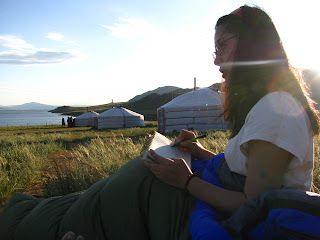













2 comments:
tschuivan sounds like yau char kuai?? 油条??
def not anything like 由条. Although they call it dough sticks, it actually looks more like noodles.
Post a Comment